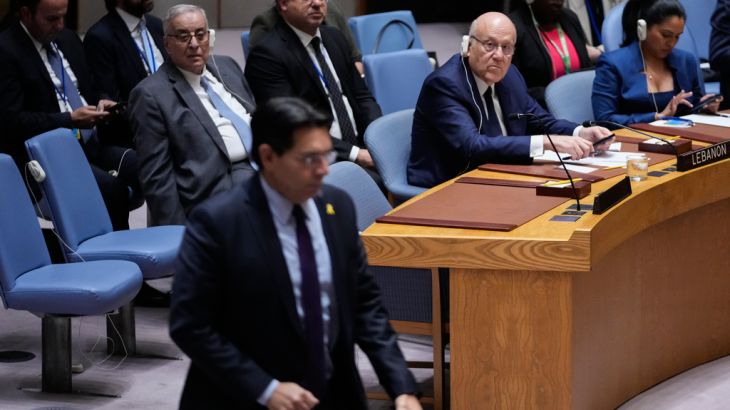Israel ‘spreading terror’, Lebanon’s PM tells UN Security Council
UN Security Council told that France, US working on 21-day ceasefire proposal as fighting between Israel, Hezbollah intensifies.
Video Duration 00 minutes 33 seconds 00:33Published On 26 Sep 202426 Sep 2024
Lebanese Prime Minister Najib Mikati has implored members of the UN Security Council (UNSC) to act as Israel’s bombardment of his country has now killed at least 620 people in the three days since Monday.
An urgent meeting of the security council was called on Wednesday by France, with the French foreign minister taking the opportunity to unveil efforts with the United States to reach a temporary pause in fighting between Israel and Hezbollah.
“Israel is violating our sovereignty by sending their warplanes and drones to our skies,” Mikati told the emergency meeting at UN headquarters in New York.
De-escalation is urgently needed, Mikati said, as Israel’s aerial bombardment, attacks on electronic devices and threatened ground invasion have spread “terror and fear among the Lebanese citizens in full view of the world”.
“I hope to come back to my country armed with your explicit stance calling for the cessation of this aggression and for the respect of the sovereignty and safety of my country,” Mikati told the 15 members of the UN’s most powerful body.
Israel’s bombing campaign killed 72 people on Wednesday, according to Lebanon’s Ministry of Health, and UN Secretary-General Antonio Guterres told the UNSC meeting of the “bloodiest day in Lebanon in a generation“, with at least 492 people killed on Monday alone, including 35 children, according to the health ministry.
France’s Foreign Minister Jean-Noel Barrot said his country had been working to address Lebanon’s concerns.
“In recent days, we’ve worked with our American partners on a temporary ceasefire platform of 21 days to allow for negotiations,” Barrot said.
Deputy US ambassador to the UN, Robert Wood, said Washington hoped the ceasefire proposal would “lead to calm and enable discussions to a diplomatic solution”.
“Nobody wants to see a repeat of the full-blown war that occurred in 2006,” Woods said, while also directing blame for Israel’s attack on Lebanon to Hezbollah’s “build up of weapons, many of which are supplied by Iran”.
Israel’s intensification of attacks on Lebanon comes as the 12-month anniversary of Hamas’s attacks on Israel on October 8 nears, and Israel’s ensuing war on Gaza approaches the one-year mark with no end in sight.
Against this backdrop of Israel’s war on Gaza and attacks on Lebanon, Israeli Prime Minister Benjamin Netanyahu is expected to arrive in New York on Thursday to make a case at the UN for his far-right government’s military operations.
Speaking to journalists outside the UNSC chamber during the meeting on Wednesday, Israel’s ambassador to the UN, Danny Danon, confirmed that Netanyahu was on his way to New York and would address the UN General Assembly on Friday.
“We are grateful for all those who are making a sincere effort with diplomacy to avoid escalation, to avoid a full war,” Danon told reporters.
Danon later told the UNSC that Iran was the nexus of violence in the region and peace required dismantling the threat.
Iran’s Foreign Minister Abbas Araghchi told reporters before the council meeting that his country supported Hezbollah and that Tehran would not remain indifferent if the attack on Lebanon escalated.
